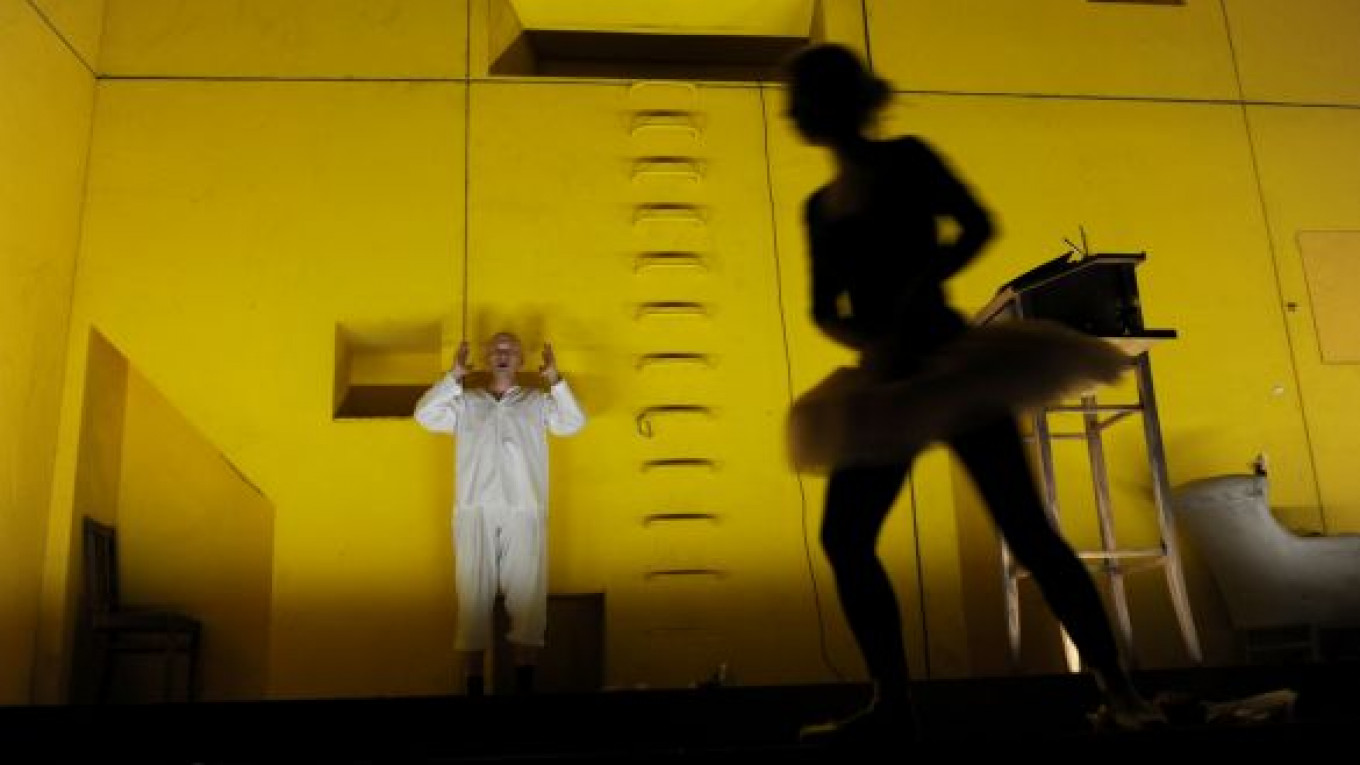Interesting how striking out in a new direction can bring about a return to origins.
In more than 40 years, Kama Ginkas had never staged a work by Nikolai Gogol. His favorite authors have been Anton Chekhov and Fyodor Dostoevsky, the latter of which, as the saying goes, was one of the Russian writers to emerge from Gogol’s overcoat.
But now we can notch Gogol onto Ginkas’ belt, as the director’s latest outing is a bracing dramatization of Gogol’s story “The Diary of a Madman.”
On one level, this is vintage Ginkas: stripped down, lean and going for the jugular — just as we have seen him stage not only Dostoevsky, but Chekhov and Pushkin as well.
And yet plenty is new.
We can start with Alexei Devotchenko, one of St. Petersburg’s best and most challenging actors, who makes his Moscow debut in this show.
Devotchenko is a powerful actor of remarkable range, capable of aggression and insolence even as he is achingly vulnerable and gentle.
And then there is the sense of color that pervades the show thanks to Sergei Barkhin’s set — a garish yellow chamber filled with strange windows, doors and niches, most of them not where you would expect to find them.
This is a madhouse, to be sure, known colloquially in Russian as a “yellow house.” But that is not sufficient to express fully the effect of this bright, colorful set. For on one of this show’s many levels, there is something almost — perhaps not quite, but almost — bright and gay about it.
This madman, locked in this cell and subjected to the surveillance of three odd figures in classical tutus, is at times belligerently satisfied with the freedom that his disintegrating mind offers him.
Devotchenko plays Poprishchin, a St. Petersburg bureaucrat, whose feverish brain mixes jealousy, anger, arrogance and romantic attractions into a flight of fancy that ends as he imagines himself the King of Spain, even as he is abused by the crude staff of an insane asylum.
Ginkas, a master of paradox and contrast, illustrates none of this. What he does cobble together brilliantly, along with Devotchenko, is a fragmented story of a modern man in the modern world.
Allow me here a brief digression.
Ginkas as an artist has long reminded me of Bob Dylan. Both work with iconic cultural references on broad, mythological canvases. Both are relentless in their desire and ability to confront artistic demons. Both love nothing so much as to shake their audiences rudely out of the ruts they occupy.
Obviously there can be no question of influence. This is strictly a matter of affinity, but in “Madman,” I saw even deeper connections arising between the two artists’ methods.
Much as Dylan’s songs, especially in recent years, leap kaleidoscopically across images, themes and points of view, Ginkas in “Madman” constantly shifts his, and thus, our angle of perception.
At one moment Poprishchin is an object of pity. At another he evokes our disgust. For a second he becomes a juggernaut laying waste to the spheres of politics and popular culture. After the blink of an eye he emerges as a symbol of everything he has mocked.
In short, Ginkas and Devotchenko leave no stone unturned in their mission to paint a scathing, all-encompassing theatrical portrait of contemporary society. In one way or another, everybody — big and small, left and right, wise and foolish, prominent and obscure — comes under attack during the course of this show.
Ginkas and Devotchenko themselves are no exceptions. At one point when the actor sarcastically slaps up pin-up pictures of President Dmitry Medvedev and pop stars Filipp Kirkorov and Alla Pugachyova on his cell wall, he also slaps up portraits of himself and his director.
You see, it’s all one messy pot of stew. Pop stardom, political power, artistic pretension — they’re all just disparate aspects of a modern, incurable madness.
In fact, art and theater may come in for Ginkas’ most stinging ridicule.
The absurd asylum workers (Mikhail Parygin, Natalya Zlatova and Ilona Borisova) doing pirouettes and pas de deux as they harass the beleaguered Poprishchin create a particularly sardonic image. Here is a suggestion that art and artists are not only flippant about the reality of the suffering they portray — they actually perpetuate it.
“The Diary of a Madman” exhibits Ginkas exploring new territory even as he mines the rich mother lode of paradox that has made him one of the most distinctive directors of our time.
“The Diary of a Madman” (Zapiski Sumasshedshego) plays Jan. 14 and 27 at 7 p.m. at the Theater Yunogo Zritelya, located at 10 Mamonovsky Pereulok. Metro Pushkinskaya. Tel. 699-5360, www.moscowtyz.ru. Running time: 2 hours.
A Message from The Moscow Times:
Dear readers,
We are facing unprecedented challenges. Russia's Prosecutor General's Office has designated The Moscow Times as an "undesirable" organization, criminalizing our work and putting our staff at risk of prosecution. This follows our earlier unjust labeling as a "foreign agent."
These actions are direct attempts to silence independent journalism in Russia. The authorities claim our work "discredits the decisions of the Russian leadership." We see things differently: we strive to provide accurate, unbiased reporting on Russia.
We, the journalists of The Moscow Times, refuse to be silenced. But to continue our work, we need your help.
Your support, no matter how small, makes a world of difference. If you can, please support us monthly starting from just $2. It's quick to set up, and every contribution makes a significant impact.
By supporting The Moscow Times, you're defending open, independent journalism in the face of repression. Thank you for standing with us.
Remind me later.







